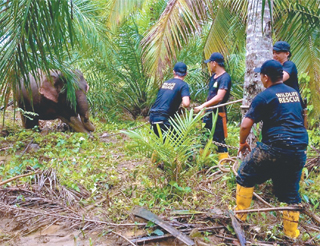'Stop land conversions where jumbos roam' call
Published on: Thursday, February 28, 2013

Lahad Datu: There is an urgent need to stop any further land conversion in elephant ranges as stated in the recently launched State's Elephant Action Plan. "All forest reserves in elephant ranges should be upgraded to Class One, providing a haven for elephants," added Dr Benoit Goossens, Director of Danau Girang Field Centre.He was commenting on the discovery of 10 elephants who ventured more than 45km from their original range, the Tabin Managed Elephant Range.
ADVERTISEMENT
They were found barely 10km from the township."We received a call from a man from Sri Tungku Simpang Ladang Permai, near the town, complaining that elephants were roaming near his house," said Jibius Dausip, senior officer from the Wildlife Rescue Unit (WRU) of the Sabah Wildlife Department which rescued and translocated the elephants from Jan. 18 to 25. They comprised nine females of various ages and one young male of about four years old. It was most likely a family group that ventured far from its range.Dr Diana Ramirez, wildlife veterinarian from WRU and Danau Girang Field Centre, said in less than eight days, they darted and secured every individual of the family group.
ADVERTISEMENT
"We then translocated all females back to Tabin Wildlife Reserve after collaring the two biggest females with satellite units provided by Danau Girang Field Centre," she said. "The young male suffered a severe injury to its trunk probably from a snare trap.
ADVERTISEMENT
"Without captive intervention it would have minimum chances of survival in the wild, and we decided to transfer him to Lok Kawi Wildlife Park," she added."It was impossible to translocate and release the whole group in one day for obvious logistics reasons," said Dr Senthilvel Nathan, Senior Wildlife Officer and WRU manager."Bikang 1 was translocated on Jan. 20 and Bikang 2 on Jan 23 and the other individuals around those dates. After one month, the two females have not met up yet. We are currently studying the possibility of releasing future translocated herds together to prevent the herd from separating," he said. "That might cost more and it would be logistically more challenging because we would need to set up a pre-release holding area and rent more lorriesÉbut our main concern is the elephants' welfare and keeping the group dynamic intact," he added. Dr Benoit Goossens, Director of Danau Girang Field Centre, meanwhile said extensive agricultural development through plantations such as oil palm have considerably reduced the habitat of the elephant and other wildlife in Sabah, therefore increasing human-elephant conflicts. "The recent deaths of 14 elephants is most likely a result of human-elephant conflict in elephant ranges and there is an obvious need to better manage the landscape within and around the plantations, by providing routes for wildlife to move from one forest to another," he said. He was referring to the shocking and mysterious discovery made by the Wildlife Department in Gunung Rara Forest Reserve, Kinabatangan, of which the cause of death is still under investigation.The first clinical test done by State Chemistry Department on samples collected from the 14 carcasses did not find any element that may have caused the deaths but the State Government through the Tourism, Culture and Environment Ministry is in the process of sending samples to two internationally recognised laboratories each in Thailand and Australia. "After one month of satellite monitoring, we can confirm that the two females have been exploring the reserve and have not (yet) ventured in plantations around Tabin. If they ever return to the vicinity of Lahad Datu, we will be able to analyse their migratory pattern and advise the plantation owners on how to fence their land to avoid any more intrusion," he explained.Establishing corridors within plantations and between forest reserves can be a solution to mitigate conflicts but refraining from further agricultural development in these sensitive areas is still the better option."Elephant translocation is part of a long-term programme that Sabah Wildlife Department and Danau Girang Field Centre started last year to tackle human-elephant conflicts in plantations such as oil palm. Funding is currently provided by The Asian Elephant Foundation and Mohamed bin Zayed Species Conservation Fund," he said.Stay up-to-date by following Daily Express’s Telegram channel.
Daily Express Malaysia




